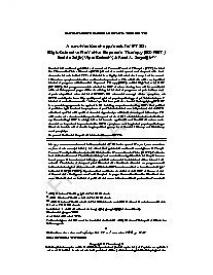A new treatment approach for PTSD : High-Intensive Narrative Exposure Therapy (HI-NET)
Current international guidelines recommend Trauma-Focused Therapies (TFT) to treat Post-Traumatic Stress Disorder (PTSD). However, non-response and dropout rates have shown to be substantial. TFT, delivered in a highly intensive dose may lead to a more efficacious symptom reduction and lower dropout rates. This article describes an inpatient treatment program with Narrative Exposure Therapy (NET), called High-Intensive NET (HI-NET).
The program consists of sixteen NET sessions during two weeks, combined with art therapy and yoga. After describing the treatment program, we present two case reports of patients who received HI-NET. We measured amongst others symptoms of PTSD and depression, sleep quality and general psychopathology at pre-treatment, posttreatment
and at four months’ follow-up. The two patients showed that applying HI-NET is a promising approach to append to the existing way of conducting NET. One patient reported a slight increase in symptoms at post-treatment, but was fully recovered of PTSD at follow-up. The other patient recovered gradually, with full recovery at follow-up. The
other measures also showed important improvements at the end of treatment and at followup.
Concluding: NET in a high intensive form is applicable and feasible. Our two cases showed an important improvement in PTSD symptoms and in general psychopathology.
More research is needed with larger patient groups to determine efficacy and efficiency more properly.
Geachte bezoeker,
De informatie die u nu opvraagt, kan door psychotraumanet niet aan u worden getoond. Dit kan verschillende redenen hebben,
waarvan (bescherming van het) auteursrecht de meeste voorkomende is. Wanneer het mogelijk is om u door te verwijzen naar de bron
van deze informatie, dan ziet u hier onder een link naar die plek.
Als er geen link staat, kunt u contact opnemen met de bibliotheek,
die u verder op weg kan helpen.
Met vriendelijke groet,
Het psychotraumanet-team.
In: Maltrattamento e abuso all’infanzia ; ISSN: 1591-4267 | 22 | 3 | november | 51-62
https://doi.org/10.3280/MAL2020-003005


